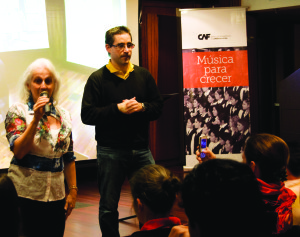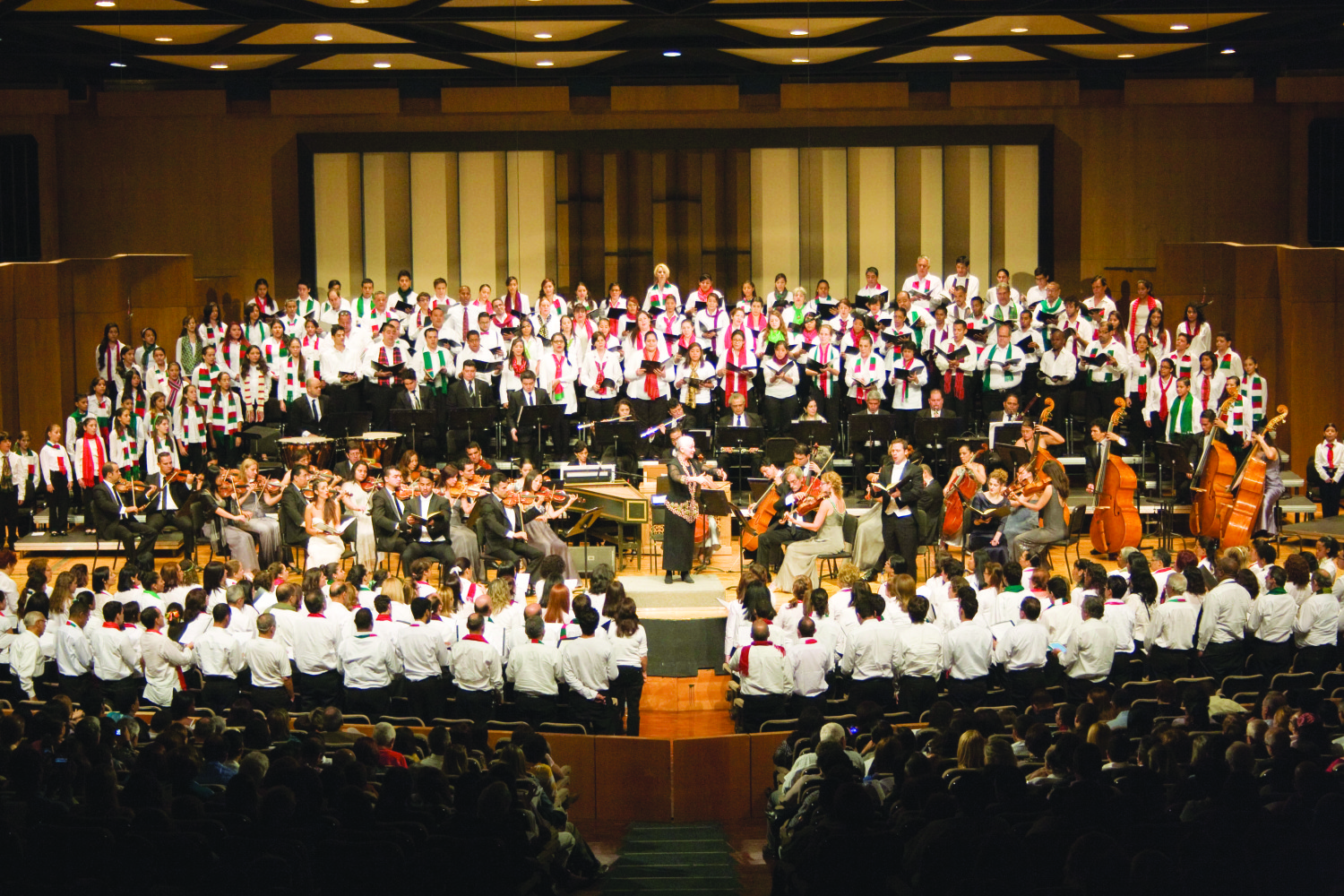By María Guinand
“It is clear that music should be recognized as an element of socialization, because it transmits the highest in social values – solidarity, harmony, mutual compassion – and has the ability to bring together an entire community and express the most sublime feelings.” (José Antonio Abreu) [1]
In our daily lives we see constant and rapid change. On the one hand, we witness important discoveries and advances in technology, science, medicine, art and education, among others, which provide for the common good. But on the other, we see persistent and troubling political, economic and social turmoil. Within this dynamic of contrasts and tensions, we, who are dedicated to choral music, often wonder how we might insert our actions and our efforts to make an effective contribution to today’s world and to human development in a community or a collective.
In these lines it is not possible to answer such a broad and complex question. But, we can review some thoughts and concepts to help us find answers and possibilities for undertaking our work.
Throughout history we find how choral music has flourished in the religious or social activities of very diverse communities, often as a vehicle for transmitting transcendent ideas, thoughts and values. We, as choir directors, choral teachers or choir singers are aware that our art, based on personal development and collective human values, holds without a doubt a unique and privileged place, and is therefore an effective tool for finding solutions to the great social problems which generate innumerable tensions and conflicts in the twenty-first century. We recognize, as collective values of choral singing: solidarity, teamwork, tolerance, integration with the environment and the sense of belonging; as values of personal growth: discipline, self-esteem, concentration, sensitivity and creativity. When all this comes together in the quest for beauty through artistic excellence, the wonderful miracle occurs, which we experience at memorable moments in our lives as musicians and leaders.

The subject of Social Action has become an important motto to guide and direct the work of many artistic, educational and sports organizations in countries where poverty and exclusion are the basis of social conflict. But it is also an important issue of debate and concern in the business and economic world, where the concept of social responsibility forms a part of the annual planning for many companies. Kofi Annan, former Secretary General of the United Nations, said recently: ‘At a time when companies spend much of their time fighting the perception that they are responsible for many of the ills of the world, taking a more active role in the fight against poverty would demonstrate that companies are part of the solution.’[2]
The thinking of Maestro José Antonio Abreu, founder of ‘El Sistema de Orquestas y Coros Juveniles de Venezuela’ (National Network of Youth and Children’s Orchestras of Venezuela), has inspired many musical organizations throughout the world to work with enthusiasm and conviction on the inclusion and rescue of youth and children through music. One of his premises is:
‘Originally, art was by minorities for minorities, and then became an activity of minorities for a majority. Today, in this century, art should be by the majorities for the majority.’[3]
Reflecting on this idea, we can certainly say that the period of choral music from the nineteenth century and throughout the twentieth and twenty-first centuries has been one of majorities for the majorities. There are many examples of choirs, festivals and choral organizations that have led to social inclusion through their work and their legacy. Today, particularly in Africa and Latin America, music, as a factor of social change, is present in multiple initiatives. And in the Middle East, choral singing serves as a bridge between peoples in conflict.
Given this, the question we ask ourselves is: ‘How can choral music become an even more powerful tool for integration and social inclusion?’
It is essential to insert our activity within the framework of action for social responsibility in business or in state social programs, and, accordingly, it is also important that our organizations are successful as artistic and social enterprises. As artists, we cannot make concessions to mediocrity in an environment that often obliges us to seek ‘simplicity’ and ‘mass production’, and thus more easily gain adherents to our cause. In this respect, we have to be creative with new teaching approaches, with attractive repertoires, and be demanding in our work and results, in order to stay true to our art of music.
However, as leaders and promoters of successful social business, we must take into account some parameters:
- ‘Innovation in artistic and pedagogical approaches, to be understood as the transformation of traditional practices’…
- ‘The sustainability of an action, which depends on the generation of institutions dedicated to sustaining initiatives in mutually beneficial partnerships with the public and private sectors’…
- ‘Planned activities must also have direct social impact, that is, be developed in direct association with the beneficiaries, with documented results which can be measured and corroborated.’
- ‘The degree of reach and expansion of the initiative beyond its initial scope and the potential for replication to other regions and in large-scale inter-institutional cooperation.’[4]
There are many areas in which we can work to make our choirs successful as artistic and social organizations, enabling us to develop our activity in a more creative and current way within the community and in partnership with the public or private sector.
We live in a complex and competitive world, where often injustice, intolerance, lack of freedom and exclusion prevail, all of which points to an uncertain future for the new generations. However, our great opportunity is to remain a part of a collective action that contributes, through choral singing, to access to a better life for many more children and young people, with freedom and hope, and to a place where they also can realize their dreams.
María Guinand, choral director, college professor, teacher and leader of national and international choral projects, has specialized in Latin American Choral Music of the 20th and 21st centuries. She was awarded the ‘Kulturpreis’ (1998) by the Inter Nationes Foundation (1998), the ‘Robert Edler Preis für Chormusik’ (2000) and the Helmuth Rilling Prize (2009). With the Cantoría Alberto Grau, she has received six awards in the competitions of Neuchatel and Arezzo (1989) and three gold medals with the Orfeón Universitario Simón Bolívar at the Choir Olympics held in Linz (2000). She currently directs the Schola Cantorum de Venezuela and Coral Fundación Empresas Polar, and is the Artistic Director for the FSCV and Advisor for the IFCM. From 1976 to 2009 she has been a close collaborator with ‘El Sistema’ as the Associate Conductor of Choral Symphonic Performances. Email: maria_guinand@yahoo.com
Translated from the Spanish by Joel Hageman, USA
[1] ‘Tocar y Luchar’ (film)
[2] http://atamayon.blogspot.com/2014/01/el-foro-de-davos
[3] ‘Tocar y Luchar’ (film)
[4] ‘Criterios de selección para el ‘Emprendedor del Año’’. Schwab Foundation for Social Entrepreneurship. [Disponible: www.schwabfound.org/colombia/criteria.htm]

